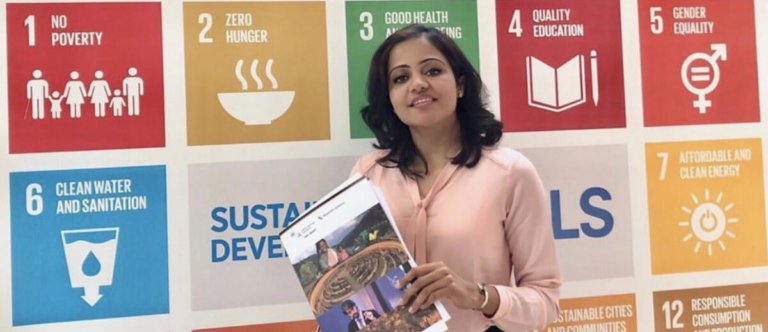
Like any journalist with a finger on the pulse, Krithiga Narayanan saw that the biggest lockdown in the world was coming.
In late March, the Indian government hastily ordered approximately 1.3 billion of its citizens and residents to stay at home for at least three weeks to contain the spread of the COVID-19 outbreak.
The impact of this on a country like India, famously touted as the world’s largest democracy, was unprecedented and unseen anywhere else in the world that was undergoing a similar lockdown. Millions were left without jobs or income, while those living its dense urban sprawling slums where disease is rife, sat sleeping toe to toe.
Isolation facilities for #COVID2019india patients being set up inside railway compartments by Indian Railways. pic.twitter.com/x7sVrgulAU
— Krithiga Narayanan (@Krithiganarayan) March 28, 2020
In Delhi alone, thousands of migrant labourers from rural areas are now jobless, and have returned home to their villages. Their earnings are so meager that some have made the hundreds-of-miles-long journey by foot. It’s still a better option than the alternative: To stay in the city is to starve and to go without shelter.
In this extraordinary situation, the role of the media is to report on what’s happening on the ground, verify what’s being said and question the powers that be.
Journalists like Krithiga may not be ER doctors or ICU nurses endangering their lives on the frontlines at India’s hospitals, some barely coping in an underfunded healthcare system. However, like other less heralded heroes, from supermarket staff stocking shelves to garbage collectors, they are just as exposed, afraid and determined.
They show up to work each day not just to keep their jobs, but to perform duties that are just as critical in keeping the country functioning. For Krithiga, it’s keeping Indians informed and its leaders held accountable.
“It is a huge challenge for journalists to provide fact-checked information and critical updates to everyone, which they are trying very hard to overcome. Due to the lockdown, many Indian journalists cannot go out on the streets and give on-the-ground reports due to safety and government restrictions,” she told Study International.

Krithiga’s interest is in investigative journalism with specific focus on environmental reporting. Source: Krithiganarayanan.com
However, fact-checking, investigations and human interest stories must go on.
“Holding people in power accountable during a public health emergency is also a vital task for a journalist,” Krithiga said.
Krithiga is a freelance journalist for the News Research Division of Daily Thanthi Group, a leading media organisation in Tamil Nadu, India.
She regularly contributes in both Tamil and English on topics that range from current affairs, politics and policy, to sustainable development and the environment, to human rights. Her work is data-intensive, producing investigative research reports. She also volunteers as the remote Deputy Editor of the London-based NGO “Women in Foreign Policy,” a multi-platform organisation on a mission to gain full societal representation in the workforce.
At 29, Krithiga amassed the kind of education that you would not expect from someone still under 30: A Master’s in International Journalism from City, University of London. A Postgraduate Diploma in Business Administration from Institute of Management Technology, Ghaziabad. A Bachelor’s Degree in Information Technology from SRM University.
She also has certificates in “Evidence Based Policy Research Methods” from the United Nations University and the Maastricht Graduate School of Governance; “Leadership Excellence” from the Indian Institute of Management Calcutta; and “Communications and New Media Executive” from National University of Singapore.

Recently, Krithiga was awarded an Environmental Reporting Fellowship by Earth Journalism Network, an initiative of International NGO Internews. Source: Krithiga Narayanan
Then there’s the special kind of education one gets as a female journalist, working in an industry still ingrained with sexist prejudices.
Until the 1960s, media houses in India only hired male journalists. Now, while there are women running newsrooms and covering prime beats like politics and foreign affairs, many believe that the worst is far from over.
For many women working in the field, the discourse has moved online, where faceless trolls and rabble-rousers label female journalists as “prostitutes,” virtually harassing them and even revealing private Whatsapp numbers to the public. When on assignments in crowded areas they face the physical realities of getting groped, teased or pinched by men around them.
Add to this the multidimensional challenges journalists face reporting on COVID-19 and Krithiga has an uphill task ahead.
Her plan is to provide the latest developments regularly through print media — which most in India still rely on — and her social media platforms. With statistics constantly evolving, it won’t be easy to provide analysis and insight of available data according to a strict ethical code, but she is determined to persevere through this.
“There are many facets to the pandemic that must be reported for people to gain a better understanding of the situation,” Krithiga said.

Krithiga was also trained by the BBC Academy in news reporting and production. Source: Krithiganarayanan.com
Her education at the Department of Journalism at City, University of London will pull her through this, she affirms.
University life extended beyond classroom learning, with students producing mock news bulletins at the campus radio and TV newsrooms. They covered all roles, from presenter to news floor manager to cameraperson and audio engineer. This hands-on experience helped her learn a lot about how a newsroom works, the practical difficulties involved and how to overcome them.
Getting international exposure and experience, like when she presented and produced live radio and TV news bulletins for the BBC — “played a crucial role” in shaping her to be the journalist she is today.
“I can confidently say that my Master’s has prepared me to be on the frontline and cover this pandemic.”
Liked this? Then you’ll love…
This team of international students are the heroes we need during COVID-19
Jobless & stranded, international students in Australia ask for government help: ‘We are humans too‘







